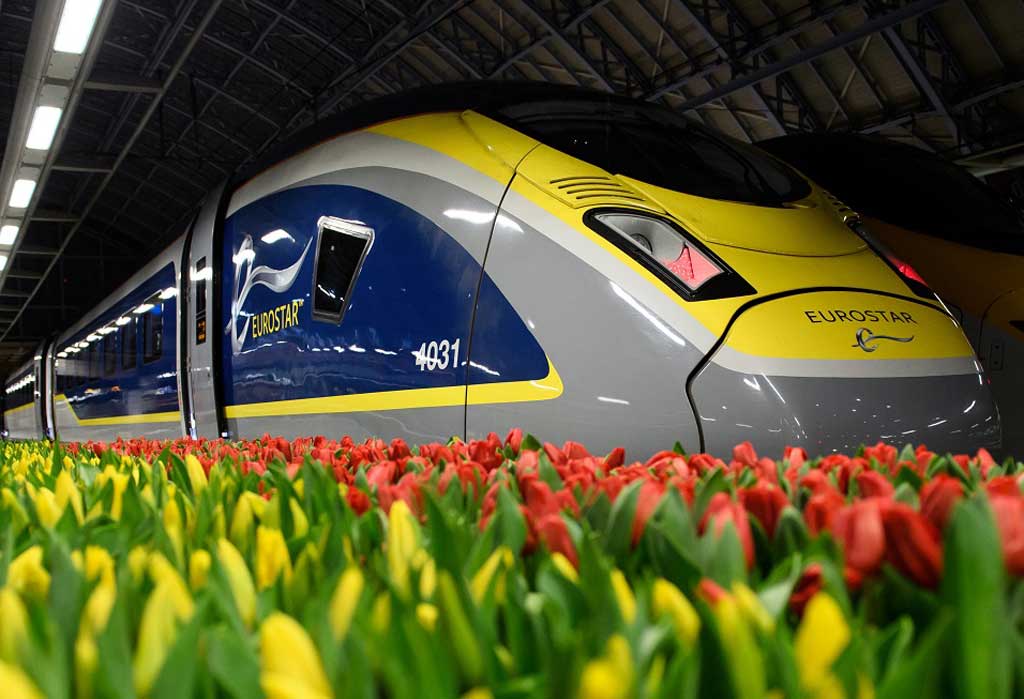
Updated January 21: The UK and French governments must make a joint commitment to support Eurostar during the pandemic, according to the Transport Select Committee chairman.
Eurostar has been hit hard by the COVID-19 pandemic, with a 95% drop in passenger numbers. The firm is running just one daily train in each direction between London and Paris, and between London and Amsterdam via Brussels.
Related articles:
- Rail staff recognised for rescuing vulnerable people
- Investigation as rail worker one second from being hit by train
- Manchester services will ‘significantly improve’ from May 2022
That is a stark change from before the pandemic, when Eurostar were operating more than 50 daily services.
Conservative Party MP Huw Merriman said the cross-Channel train operator plays a vital role in enabling low-carbon international travel.
Eurostar is 55% owned by French state rail company SNCF, while the UK government sold its stake to private firms for £757 million back in 2015.
SNCF chief executive Jean-Pierre Farandou told France Inter radio this week that “the situation is very critical for Eurostar”.
Mr Merriman said: “We simply cannot afford to lose Eurostar to this pandemic. The company contributes £800 million each year to the UK economy. It is unique in offering an environmentally friendly, direct, connection to mainland Europe.
“Trips from London to Paris, Brussels and Amsterdam on the Eurostar emit between 80-90% less greenhouse gas emissions per passenger than the equivalent short-haul flights.
“Like airlines, quarantine and travel restrictions have blighted Eurostar’s access to its markets during the pandemic. Unlike airlines, Eurostar has been shut out from government loans that have offered a lifeline.”
He added: “It needs a joint, bespoke UK-French solution to help it through this crisis.”
Mr Merriman’s comments came after business leaders in London urged the government to offer financial assistance to Eurostar.
Meanwhile, a French transport economist told the Transport Select Committee on Wednesday that he believes the UK will be asked to contribute to the survival of the operator.
Professor Yves Crozet, of the University of Lyon, said: “I suppose that the French government will support Eurostar, but not alone. We will have probably an arm wrestling match between the UK and France about that.
“But clearly Eurostar is a subsidiary of SNCF, and SNCF has the majority of the capital. So clearly the money will come from France in a very important part but maybe France will ask the UK to give also some hand to the system.”
Earlier this week, business leaders in London urged the government to offer financial assistance to the struggling firm.
Campaign group London First warned not to let the cross-Channel rail operator “fall between the cracks of support”.
It went on to emphasise how important the firm would be in maintaining a healthy relationship with “our European neighbours” in the post-EU future.
The letter read: “If this viable business is allowed to fall between the cracks of support – neither an airline, nor a domestic railway – our (UK’s) recovery could be damaged. ”
It continued: “Eurostar is not asking for special treatment.
“We urge you to ensure that they have equal access to financial support as companies in similar positions – at the very least this should include business rates relief and access to Government loans.
“Maintaining this international high-speed rail connection into the heart of London has never been more important.
“Having left the EU, we need to actively set out our stall as an attractive destination for people to live, work and play.
“Safeguarding the future of this connection to the continent should be a symbol of both our desire to build back better and our new cooperative relationship with our European neighbours. ”
Among the 28 institutions that signed the letter were Fortnum and Mason, Middlesex University and property company Shaftesbury.
Eurostar described the current situation as “very serious”.
A statement read: “Without additional funding from government there is a real risk to the survival of Eurostar, the green gateway to Europe.”
Jim McMahon, Labour’s shadow transport secretary, called for “a comprehensive strategy” to be adopted.
A Department for Transport spokesperson said: “We recognise the significant financial challenges facing Eurostar as a result of COVID-19 and the unprecedented circumstances currently faced by the international travel industry.
“The Government has been engaging extensively with Eurostar on a regular basis since the beginning of the outbreak.
“We will continue to work closely with them as we support the safe restart and recovery of international travel.”


